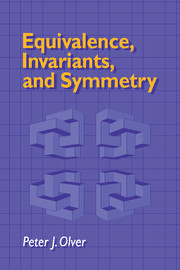Book contents
- Frontmatter
- Contents
- Preface
- Acknowledgments
- Introduction
- 1 Geometric Foundations
- 2 Lie Groups
- 3 Representation Theory
- 4 Jets and Contact Transformations
- 5 Differential Invariants
- 6 Symmetries of Differential Equations
- 7 Symmetries of Variational Problems
- 8 Equivalence of Coframes
- 9 Formulation of Equivalence Problems
- 10 Cartan's Equivalence Method
- 11 Involution
- 12 Prolongation of Equivalence Problems
- 13 Differential Systems
- 14 Frobenius' Theorem
- 15 The Cartan–Kähler Existence Theorem
- Tables
- References
- Symbol Index
- Author Index
- Subject Index
14 - Frobenius' Theorem
Published online by Cambridge University Press: 05 August 2012
- Frontmatter
- Contents
- Preface
- Acknowledgments
- Introduction
- 1 Geometric Foundations
- 2 Lie Groups
- 3 Representation Theory
- 4 Jets and Contact Transformations
- 5 Differential Invariants
- 6 Symmetries of Differential Equations
- 7 Symmetries of Variational Problems
- 8 Equivalence of Coframes
- 9 Formulation of Equivalence Problems
- 10 Cartan's Equivalence Method
- 11 Involution
- 12 Prolongation of Equivalence Problems
- 13 Differential Systems
- 14 Frobenius' Theorem
- 15 The Cartan–Kähler Existence Theorem
- Tables
- References
- Symbol Index
- Author Index
- Subject Index
Summary
The basic existence result in our subject (except in those situations where we must appeal to the more complicated Cartan–Kähler Theorem) is the Theorem of Frobenius characterizing solutions to involutive systems of first order partial differential equations. Frobenius' original version of this theorem, [73], was stated directly in the language of partial differential equations. Later, in view of its important applications in differential geometry, an equivalent formulation in terms of integral submanifolds of systems of vector fields on a manifold was popularized. Alternatively, as emphasized by Cartan, the theorem can be formulated in the language of differential forms, providing an existence theorem for integral submanifolds of closed differential ideals generated by one-forms. In this chapter, we begin with the statement and proof of this fundamental theorem; applications to the Cartan equivalence method will follow. The equivalence applications are based on Cartan's “technique of the graph” in which the required equivalence transformation is reconstructed from its graph, which forms an integral submanifold of an appropriate differential system on the Cartesian product of the domain and range manifolds.
Vector Field Systems
We shall begin our presentation with the vector field version of the theorem of Frobenius. Let M be a smooth manifold of dimension m and consider a regular vector field system ν of constant rank n. In this case, any integral submanifold N of the system can have dimension at most n. Frobenius' Theorem says that, for constant rank systems in involution, this dimension is actually attained, and the vector field system is integrable.
- Type
- Chapter
- Information
- Equivalence, Invariants and Symmetry , pp. 421 - 446Publisher: Cambridge University PressPrint publication year: 1995



